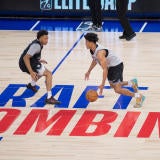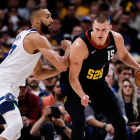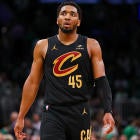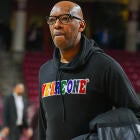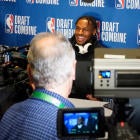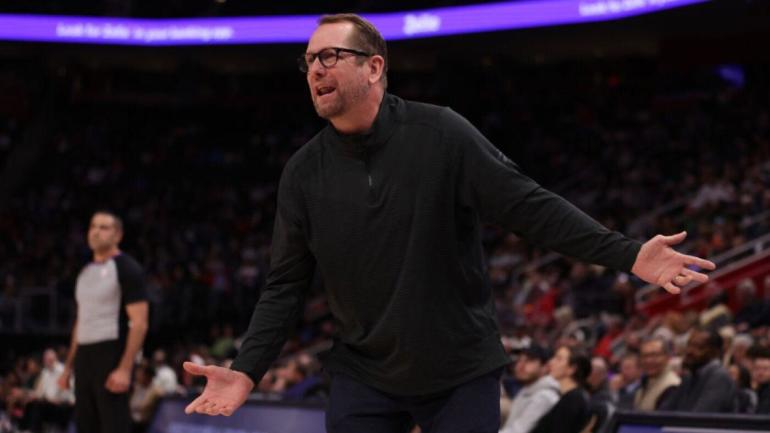
The Toronto Raptors fielded several trade offers for impending free agent point guard Kyle Lowry at the 2021 trade deadline. The Los Angeles Lakers, Miami Heat and Philadelphia 76ers among others were known to be interested at the time. It isn't clear what exactly was offered, but Michael Scotto of HoopsHype reported that Philadelphia was willing to put Tyrese Maxey on the table, and according to ESPN's Brian Windhorst, the Heat offered Duncan Robinson, who, at the time, was mere months away from signing a $90 million contract. At the very least, we can therefore surmise that the offers were significant.
Yet the 2021 trade deadline came and went without a Lowry deal. It was a puzzling decision at the time. Toronto was in the middle of its infamous "Tampa tank," and therefore did not need Lowry for a playoff run, and the entire basketball world knew he was leaving after the season. But the Raptors kept him, waited until the offseason, and then dealt him for the far-less enticing Precious Achiuwa (who has shown promise but is now likely relegated to a bench role) and Goran Dragic, who did not want to play for them. Waiting almost certainly cost the Raptors a better deal.
A very similar scenario played out on Thursday. The Raptors have two key impending free agents in Fred VanVleet and Gary Trent Jr. Their two best remaining veterans, OG Anunoby and Pascal Siakam, can become free agents after next season. Anunoby is reportedly unhappy with his role. Nick Nurse has publicly criticized Trent's defense. Yet when the dust settled, Toronto had made only a single move: a surprisingly lightly protected 2024 first-round pick for Spurs center Jakob Poeltl, who will also be a free agent after the season.
VanVleet, Anunoby and Poeltl have all been earning well below market value for the past several years. Siakam has made All-NBA Teams in two of the past three seasons and may qualify for a supermax deal. VanVleet has denied turning down a $114 million extension... but he hasn't signed a new deal either. Anunoby is represented by Klutch Sports, the NBA agency most notorious for forcing moves when players are unhappy, and on a roster with so many players seeking new contracts, it's hard to imagine he gets the shots and touches he's looking for. Simply put, the Raptors cannot afford to keep all five of these players, especially with a new Scottie Barnes deal looming after next season.
Even if the Raptors could keep everyone, should they want to? The Raptors are 26-30. They are 101-109 over the past three seasons, and even in their most recent playoff appearance, they got smacked by the 76ers in the first round a season ago. Barnes, Siakam and Anunoby have overlapping skill sets. Poeltl may give them the center that they've wanted for years, but he cramps the floor even further for an offense that currently ranks 27th in half-court points per play, according to Cleaning the Glass. The Raptors have plenty of talent. That's why the entire NBA was trying to trade with them over the past several weeks. But it seems pretty clear at this point that the way that talent has been combined and utilized simply isn't going to lead to sustained winning. The Raptors didn't need a complete teardown, but they needed to change one or two significant parts.
They didn't, and it seems as though Toronto's lofty trade demands are the explanation. The Warriors reportedly made a push for Anunoby, but according to C.J. Holmes of the San Francisco Chronicle, Toronto demanded Jonathan Kuminga, other players and draft picks. Golden State balked. A number of teams made apparent pushes for VanVleet, including the Lakers and Clippers, who both settled on other guards. If all of this sounds familiar, it's because the 2021 deadline featured similar rhetoric. According to Windhorst back in 2021, the 76ers were "permitted to trade '21 and '23 first-round picks — this year's pick and in 2023. Plus they have Tyrese Maxey, their young guard out of Kentucky. And plus have Matisse Thybulle. Toronto would like all of those pieces. And from what I've been told, Philly has not been willing to put that whole package in there." Such demands were obviously unreasonable. No Lowry deal materialized.

CBS Sports HQ Newsletter
Your Ultimate Guide to Every Day in Sports
We bring sports news that matters to your inbox, to help you stay informed and get a winning edge.
Thanks for signing up!
Keep an eye on your inbox.
Sorry!
There was an error processing your subscription.
And now, the Raptors are in jeopardy of a similar fate this offseason. They can try to negotiate sign-and-trades for VanVleet and Trent, but rival teams only need to cooperate if they lack cap space. At least one known VanVleet suitor—Orlando—is set to have more than enough cap space to sign him outright, and the Magic play in a state without income taxes, Toronto will need to outbid them to get on even footing. Houston has been linked to VanVleet in the past and presents a similar threat. Part of the appeal of trading for Anunoby now is his contract, but any team who gets him next summer will only have him for one guaranteed playoff run as opposed to the two he could have provided had he been moved at the deadline. That's going to impact his value. The same is true of Siakam, though he is being paid fair market value.
All of this paints one of the NBA's most revered organizations in a somewhat new light. The Raptors are masters of scouting and player development, but perhaps less adept at the asset-management portion of building a competitive NBA roster. Though not all of these defections were in their control, it should be noted that Toronto lost half of its 2019 championship rotation (Kawhi Leonard, Danny Green, Marc Gasol and Serge Ibaka) for nothing as free agents within two years of that title. Lowry was traded for pennies on the dollar. They've now given away valuable first-round picks at back-to-back deadlines, and the player they acquired last season, Thaddeus Young, gave them only around 18 minutes per game (and fewer in the postseason).
The Raptors are so good at identifying and cultivating talent that these shortcomings have thus far proven surmountable. That might not be the case forever. No NBA team can continue losing this many valuable players for lesser or no value forever and expect to build a real winner. Thursday was Toronto's best chance to pivot into a more sustainable model of team-building. They didn't do that, and it may just cost them big time when the offseason arrives.











